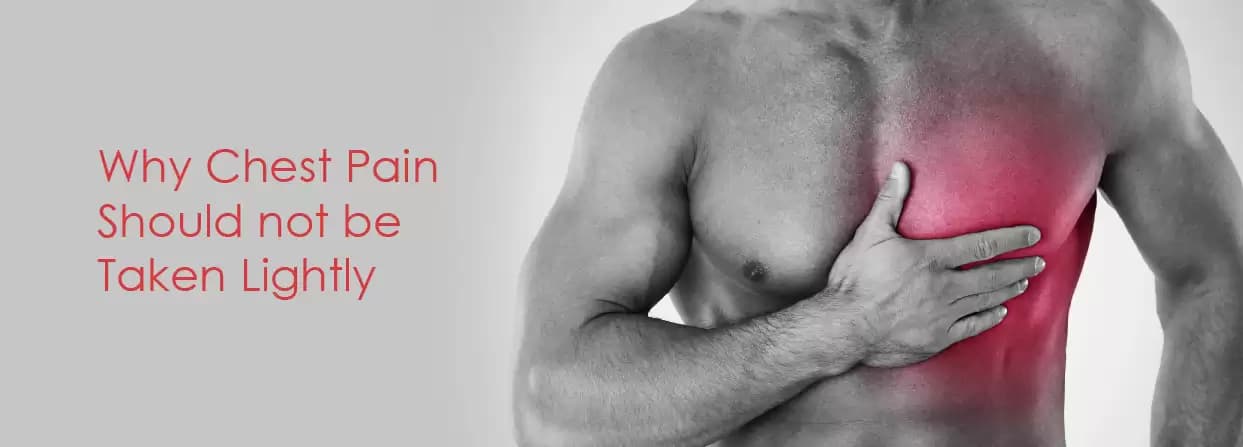
Chest pain isn't a sign that you should be ignoring or taking for granted. There can be a plethora of reasons behind it and some of these can be quite serious. People usually tend to believe that their chest pain is due to acidity or something that they ate, but this is not always the case.
Chest pain isn't a sign that you should be ignoring or taking for granted. There can be a plethora of reasons behind it and some of these can be quite serious. People usually tend to believe that their chest pain is due to acidity or something that they ate, but this is not always the case. It is pertinent to note that our body has its ways of telling us that something is wrong and it is solely up to us to get ourselves evaluated and find the underlying cause. Experts specializing in coronary angiography in Kolkata suggest that having chest pain does not necessarily mean that you have some serious health condition, however pinpointing the underlying cause can help in the effective treatment of the management of the problem and the sooner it is detected, the better.
Your chest pain could be because of a cardiovascular problem, a pulmonary condition, gastrointestinal disease, or even stress. In this blog, we are going to talk about everything that might be causing you chest pain with the help of the leading heart specialist in Kolkata, BM Birla Heart Research Centre. Please note that the information given in this blog is completely research-based and we do not in any way promote the idea of ignoring the signs of chest pain.
Chest pain is a pain or uneasiness that can occur in any part of your chest. It might circulate to other areas of your upper body including your jaw, neck, or arms. You might experience sharp or dull pain in your chest followed by achiness and tightness. Usually, if you experience chest pain often, you will notice that it lasts for a few minutes or hours. However, in certain cases, chest pain might last for more than six months as well. And, with time it might deteriorate while exerting and only improve when the person is at rest. However, for some people, it might occur even when they are at rest. Chest pain can be felt on any side like the middle of the chest, right-side chest pain, and left-side chest pain. Hence, it is important to seek prompt clinical attention for chest pain mainly when it indicates a heart attack or any other serious problem.
Chest pain might vary from person to person depending on what is causing the symptom. However, there cannot be an easy way to apprise without consulting a healthcare expert. Here are some chest pain symptoms related to the heart:
Without consulting a doctor, it is difficult to figure out if the chest pain is related to the heart or is due to something else. Chest pain usually is because of heart issues, however, other reasons might be causing the symptoms:
Chest pain can be linked to heart, lungs, digestion, and other problems. It can get complex to diagnose as they have several causes. Healthcare experts consider identifying serious causes first. Here are some of the chest pain causes:
Chest pain diagnoses are initiated depending on the symptoms of a patient and involve several steps such as:
Chest pain treatment completely depends on its causes and if it is due to a heart attack, treatment is given immediately as soon as the patient seeks assistance. Here are some of the options available for chest pain treatment:
Chest pain can occur due to reasons, some of them can be harmless, while others can be hazardous. It is important to comprehend your chest pain nature, symptoms, and when you should seek clinical assistance for your health. If you notice signs of chest pain, mainly if they are severe or followed by serious symptoms, make sure to consult your doctor immediately. Don’t take chest pain lightly and always prioritize your health first.
Yes, anxiety and stress are the contributing factors to chest pain.
Chest pain is among other causes of chest pain, however, it is not very common.
Yes, chest pain is normal during pregnancy. It can occur due to heartburn, pressure, or a growing uterus pushing against the organs.
Written and Verified by:

Dr. Dhiman Kahali is the Director of Interventional Cardiology Dept. at BM Birla Heart Hospital, Kolkata, with over 37 years of experience. He specializes in angioplasty, mitral balloon dilation, and peripheral vascular interventions, and has been honored with the Gandhi Centenary and Mother Teresa International Awards.
Similar Cardiology Blogs
Book Your Appointment TODAY
© 2024 BMB Kolkata. All Rights Reserved.